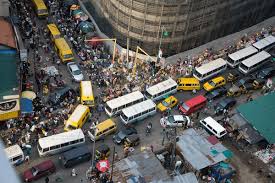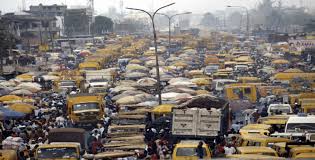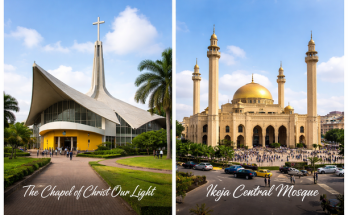By Chiagoziem Abosi
From the moment the first bus horn blares at 5:00 a.m. to the last market stall closing at night, Lagos never rests. The city pulses with energy, movement — and people. Everywhere you turn, someone is either hustling, pushing through traffic, or looking for space in a city that seems to shrink daily.
Lagos is Nigeria’s smallest state by landmass, yet it is home to over 20 million people — and counting. With more births, more migration, and more hustle every day, many residents are asking: Is Lagos outgrowing itself?
“I wake up at 4am just to beat the crowd” — Commuter

For Aisha, who works on the Island but lives in Iyana-Ipaja, the daily struggle is more than just exhausting.
“If I don’t leave home before 4:30 a.m., I won’t reach office before 9 a.m. The traffic is mad, and everywhere is jam-packed. It’s like we are too many and the roads are too small.”
Her experience isn’t unique. From bus stops to pedestrian bridges, the congestion is visible and growing. Public transport is stretched thin, and new buses are few and far between.
“There’s no space left to build, yet rent keeps going up” — Landlord

Mr. Aluko, a landlord in the Agege area, says space has become a luxury.
“When I was younger, we had compound space for children to play. Now, developers are squeezing four flats where one bungalow used to be. There’s no privacy anymore, and still — rent no dey cheap.”
Lagos’ population boom has triggered a construction race, but it’s not enough to keep up with demand. Housing is expensive, overcrowded, and often poorly planned.
“Markets are now shoulder-to-shoulder” — Market Trader
Mama Ifeoma, who runs a vegetable stall at Ketu market, says the crowd is a daily challenge.
“Before, we used to sell in peace. Now, every stall is squeezed. One person dey carry ten loads, another dey push wheelbarrow. No space to move.”
Sanitation has become harder, theft has increased, and tension rises quickly in such tight quarters.
What Is the Government Doing About It?

The Lagos State Government has acknowledged the rising population pressure and is investing in major infrastructure projects to improve movement, housing, and service delivery.
Some of the key initiatives include:
- The Lagos Red Line Rail, which began partial operations in October 2024, runs from Agbado to Oyingbo. When fully completed, it’s expected to ease the stress of daily commuting for thousands of Lagosians.
- The Lekki Deep Sea Port, launched in 2023, is one of the largest in West Africa and is designed to handle over 2.5 million containers annually. It aims to reduce traffic congestion in Apapa and Tin Can ports and support Lagos’ expanding commercial needs.
- Urban expansion into new districts like Epe and Badagry is also being encouraged, with the proposed Green Line rail project expected to connect Marina to the Lekki Free Trade Zone — potentially serving over 500,000 passengers daily.
Despite these developments, critics say the pace of implementation is far slower than the rate of population growth. Reports from the National Population Commission and housing experts show that Lagos gains over 600,000 new residents every year. With over 20 million people already living in the state and a housing deficit of over 3.3 million homes, the pressure is mounting fast.
“They’re building, yes — but we’re multiplying faster than they can pour concrete,” one urban planner remarked.
So while the vision for a decongested, well-connected Lagos exists on paper, the reality for most residents is still traffic, tight housing, and long queues.
Build More or Move Out?

As Lagos continues to grow, residents are left with hard choices: adapt, relocate, or keep enduring. For some, the dream is now to “make it and leave Lagos.” For others, the city still represents hope — even in its crowded chaos.
But one thing is clear: Lagos needs better planning, more infrastructure, and bold solutions — fast.
💬 Tell Us in the Comments:
How has overpopulation in Lagos affected your life?
Let’s talk — your voice matters.








